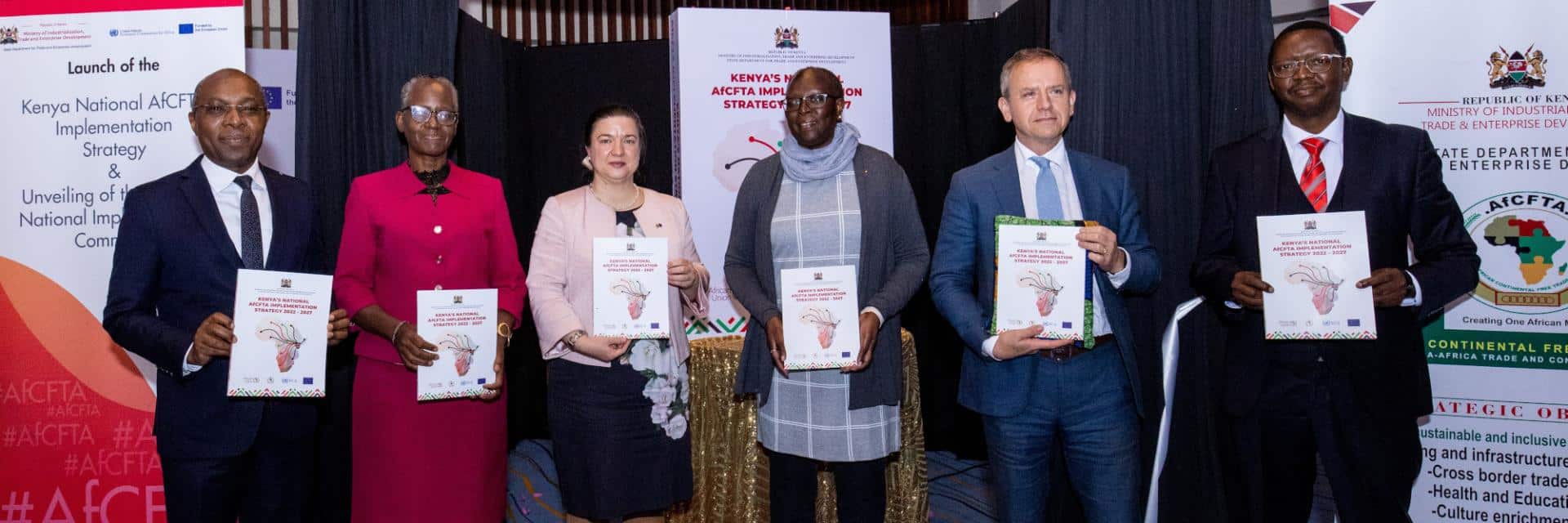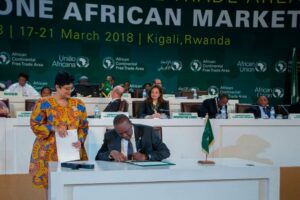
Individual Nation’s Active Response to AfCFTA Implementation
A Little Slumber…
The African Continental Free Trade Area’s (AfCFTA) blueprint paints the picture of the Africa we want by creating one African market. The free trade area agreement is one of several flagship projects of Africa’s agenda 2063, a high-ambition trade agreement signed by 54 members as of February 2023 and has 44 state parties. The project’s scope includes improving critical areas of Africa’s economy around trade and investment by eliminating barriers to trade in Africa, boosting intra-Africa trade and potentially lifting 30 million people out of extreme poverty. While the agreement promises to boost the continent’s trading position in the global market and strengthen a common voice and policy space in global trade negotiations, the 54 members of the project highlight the dangers of addressing the implementation collectively. Instead, there is a need for increased emphasis on efforts by individual nations and what the state must do to enhance the fruition of the project.
Efforts on laying the framework for the implementation of the AfCFTA have collectively called on African countries to, for instance, work on establishing a linked quality and sustainable infrastructure. Emphasizing the role of individual countries in these efforts to actualize the promise of the AfCFTA is critically needed. There should be no member in slumber and expecting other member nations to actualize the dream for the her. Attributes of dwindling country competitiveness, high costs of doing business, bureaucratic policies, and challenging regulatory environment but be addressed at the country level in as much as the free trade area lays a framework for responding to the challenges. The first step for individual countries is the ratification of the framework. Countries such as Kenya have established a national AfCFTA implementation strategy with an ad-hoc committee to incorporate aspirations of the continent into those of the country.
Contradicting Aspirations
Any serious governance structure recognizes the need for individual countries to have national development goals and aspirations that often contradict those outlined in the AfCFTA. This has often been indicated by bilateral agreements between African nations and their international counterparts that could create policies that impede the actualization of the AfCFTA. National strategies are needed to align the aspirations to those of the free trade area and fast truck its fruition. Nations must be ready to draw from state departments, the private sector, academic and research institutions, and non-governmental actors for effective and coordinated efforts in the implementation. This response to the fragmentation in the African continent for trade by converging national and continental aspirations. Fast-tracked negotiations within the African Union require this national commitment from countries to implement the AfCFTA.

Photo: Stakeholders During the Launch of the Kenya National AfCFTA Implementation Strategy 2022-2027 and Committee Unveiling in Nairobi
Of Collective Efforts
The development of national and regional AfCFTA strategies to provide coordinated efforts to the trade and investment opportunities is well on track, with over 45 members completing or in the process. However, the important documents largely remain confidential. This eliminates the general public from the implementation of the framework. With the backbone of the African trade being women, the youth, and essentially small and medium-sized enterprises, national AfCFTA strategies must initiate public awareness campaigns. Countries, therefore, need to prioritize the publicization of these strategies through traditional and digital media to increase awareness among stakeholders. The private sector, general public, and chamber of commerce must be included in the actualization process at a national level. No efforts can be ignored in this process, and success stories must be shared and celebrated to rally the public behind the AfCFTA.
Individual nations need to reflect on the efforts of the AfCFTA secretariat in facilitating the efficient conduct of business in the region. Nations have to be guided by working programs, annual budgetary allocations, and the implementation of collective decisions among member states. A regime reflecting conditions under which the national and AfCFTA aspirations intersect to be implemented within member states. In line with a digital market aspiration of the framework, online mechanisms of monitoring, reporting, and eliminating non-tariff barriers have a genesis within individual members. Non-trade barriers constitute a significant hindrance to intra-African trade, whether administrative, poor infrastructure, or administration challenges. Nations must monitor and report these challenges to ensure continuous and consistent elimination. Trade information on opportunities, trade data, and export and import data should be provided and publicized as a priority within member countries to benefit traders. There can be no investment decision-making to the benefit of the AfCFTA without accurate and readily available trade data.
“There should be no member in slumber and expecting other member nations to actualize the dream for the her.”
The onus is on African countries to take individual responsibility to liberalize trade by reviewing longer time-limiting regulatory policy frameworks. Nations have to foster a friendly environment for doing business by reducing barriers to trade with deliberate actions to enhance the ease of doing business and improving infrastructure. National AfCFTA strategy has to focus on promoting industrialization and diversification of economies to increase competitiveness while reducing overall dependence on a limited number of commodities. With a focus on small and medium-sized enterprises, nationals must encourage entrepreneurship, innovation, and investment in critical sectors with sound policies and regulatory frameworks. Members will also need to work with other African countries to improve trade and investment flows, promote regional integration, and continuously eliminate barriers to cross-border trade. Strengthening institutions and governance will further support trade, investment, and economic integration among member nations. Flagged by technical support to businesses, more enterprises need enabling to participate effectively in the AfCFTA with addressed non-tariff barriers such as standardization and certification challenges. The sanity to enhance ease of doing business within borders and across the continent has to prevail.



